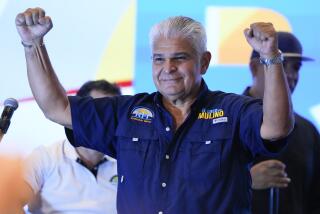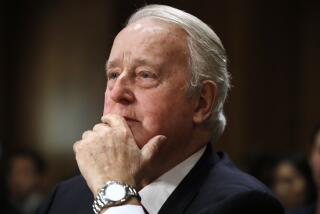Michael Manley; Past Leader of Jamaica
- Share via
KINGSTON, Jamaica — Michael Manley, the former prime minister who took Jamaica to the forefront of the developing world’s nonaligned movement in the 1970s, has died. He was 72.
Manley died at his home Thursday night, the official Jampress news agency reported Friday. He had been battling prostate cancer.
In his first two terms as prime minister, from 1972 to 1980, Manley was a firebrand socialist and champion of the nonaligned movement. He forged close ties with Cuban leader Fidel Castro, railed against capitalist domination and discouraged foreign investment.
By the end of 1980, Jamaica was nearly bankrupt and Manley was defeated by conservative Edward Seaga, who became the Reagan administration’s closest ally in the Caribbean.
“We’re not trying that again,” Manley told The Times, referring to the pro-Castro, nonalignment stance of the 1970s. “We tried it and it cannot work.”
In 1989, a new Manley emerged. The anti-imperialist rhetoric was gone, along with his trademark bush jacket. Manley espoused capitalism, private investment and good relations with the United States. Helped by a worsening economy, he trounced Seaga in national elections.
But he never toned down his tendency to speak out when he felt it was necessary.
After the U.S. invasion of Panama in December 1989, Manley surprised some U.S. officials during a visit by Vice President Dan Quayle to quell unease in the region over the military action.
Manley said ousted Panamanian Gen. Manuel Antonio Noriega had “raped democracy,” but he told Quayle that he disagreed with the invasion because the United States had to respect the sovereignty of other nations.
Charismatic, tall and handsome, Manley was a powerful orator often called “Joshua,” after the Old Testament prophet.
Michael Norman Manley was born Dec. 10, 1924, the son of Norman Washington Manley, who founded Jamaica’s social democratic People’s National Party, and Edna Swithenbank, a noted sculptor.
The future prime minister graduated from Jamaica College in 1943 and served in the Royal Canadian Air Force until the end of World War II. He obtained an economics degree at the London School of Economics and spent a year as a freelance journalist for the British Broadcasting Corp. In the early 1950s, he became involved in Jamaica’s trade union movement.
Manley was given an appointed senator’s seat in 1962 and was elected to parliament in 1967. He succeeded his father as People’s National Party president in 1969.
Citing health reasons, Manley quit as prime minister March 28, 1992, and was succeeded by P.J. Patterson.
More to Read
Sign up for Essential California
The most important California stories and recommendations in your inbox every morning.
You may occasionally receive promotional content from the Los Angeles Times.













